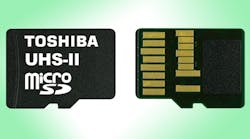Toshiba is the first company to comply with the UHS-II interface standard with its microSD cards. UHS-II is the ultra-high-speed serial bus interface in SD Memory Card Standard Ver4.20 that delivers data at 156 Mbytes/s by single-lane access and 312 Mbytes/s by dual-lane access.
The new memory cards will be available in 32 and 64 Gbytes and are UHS Speed Class 3 (U3) enabled. The 32-Gbyte cards achieve maximum read speeds of 260 Mbytes/s and maximum write speeds of 240 Mbytes/s.
The write speed is eight times faster than Toshiba’s UHS-I equivalent, while the read speed is around 2.7 times faster. The 64-Gbyte cards achieve maximum read speeds of 145 Mbytes/s and maximum write speeds of 130 Mbytes/s.
Faster microSD cards will allow camera users to shoot digital still images continuously at high speed. The new Toshiba cards allow high-quality 4K video capture at constant minimum write speeds of 30 Mbytes/s. This means that 4K2K video, live broadcast, and content can be recorded on high-performance cameras.
